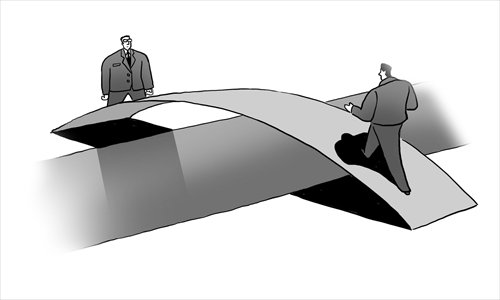Xi’s warmth makes Beijing-Seoul ties cozy

Illustration: Liu Rui/GT
Chinese President Xi Jinping's visit to South Korea last week drew worldwide attention because it broke the long-standing tradition in which a new Chinese leader always makes a visit to Pyongyang ahead of Seoul. South Koreans welcomed him enthusiastically, and President Park Geun-hye seized upon this unprecedented moment of affinity. The bilateral status between the two countries was upgraded to that of a mature "strategic cooperative partnership."
Progress on the economic front was impressive. Both leaders agreed to expedite conclusion of the China-South Korea free trade agreement within this year, and to introduce direct won-yuan trading, a move that could generate huge benefits for exporters in both countries by slashing currency conversion costs and reducing risks. This also implies that the yuan will have a greater influence over the South Korean economy in the future.
Seoul also responded positively to Xi's proposals for strategic policy cooperation on the Shanghai free economic zone, creation of South Korea-China joint industrial zones, and tackling trade protectionism. Despite US opposition, Seoul agreed to consider joining the Chinese initiative for an Asian Infrastructure Investment Bank, which Beijing is organizing as a mechanism to bankroll more infrastructure projects in underdeveloped Asian nations.
Although Xi and Park expressed their clear opposition to nuclear weapons on the Korean Peninsula and agreed to explore ways to resume the long-stalled Six-Party Talks, there were some nuanced gaps in their positions.
Whereas Xi emphasized the "denuclearization of the Korean Peninsula," Park underscored "the denuclearization of North Korea first." Xi called for the resolution of the North Korea nuclear issue through dialogues and negotiations, especially the immediate resumption of the Six-Party Talks, but Park was rather reluctant to endorse that view. She hinted during the summit that Seoul would not return to the negotiations unless Pyongyang first shows a sincere attitude toward abandoning its policy of simultaneously pursuing economic development and nuclear weapons.
On the occasion of Xi's visit, Seoul hoped Beijing would take its side and use its influence over Pyongyang to facilitate a breakthrough in stalled inter-Korean relations. Xi did express his support for Park's "Korean Peninsula trust-building process," because it will ease tensions and foster peace and stability on the peninsula. To Seoul's disappointment, however, Xi did not formally endorse Park's Dresden initiative on Korean reunification, which North Korea criticized as being a subtle move toward "unification by absorption," and instead called for an independent and peaceful reunification.
Most observers in Seoul saw Xi's visit as a strategic step to win the hearts and minds of South Korean leaders and people, and thus to weaken the South Korea-US alliance and Japan-South Korea-US trilateral cooperation and coordination by taking advantage of worsening Seoul-Tokyo relations. But that did not take place. And the official communiqué did not mention anything about Japan.
Two factors prevented Seoul from taking Beijing's side on this issue. One is Washington's anxiety over Beijing's exploitation of souring Seoul-Tokyo ties, and the other is the recent rapprochement between Pyongyang and Tokyo. The latter was of particular concern, because the Japanese cabinet announced the lifting of some of its bilateral sanctions on North Korea just one day before the summit.
Throughout his visit to Seoul, Xi emphasized the importance of bilateral cooperation in building a new Asian security architecture for multilateral security. His vision dovetails with Park's Northeast Asian Peace and Security Cooperation Initiative, but Seoul fell short of endorsing it, because of fear of risking its alliance with the US.
In sum, Xi's visit to Seoul set a new milestone in bilateral relations. However, both leaders failed to narrow the gap on the issues of North Korea's nuclear ambitions and inter-Korean relations. In addition, Seoul's adherence to its alliance with the US remains incompatible with Beijing's new concept of Asian security. Xi's happy visit notwithstanding, the geopolitical calculus of Beijing-Seoul ties is still trapped in "hot economy, cold politics."
The author is professor of political science, Yonsei University, Seoul. opinion@globaltimes.com.cn